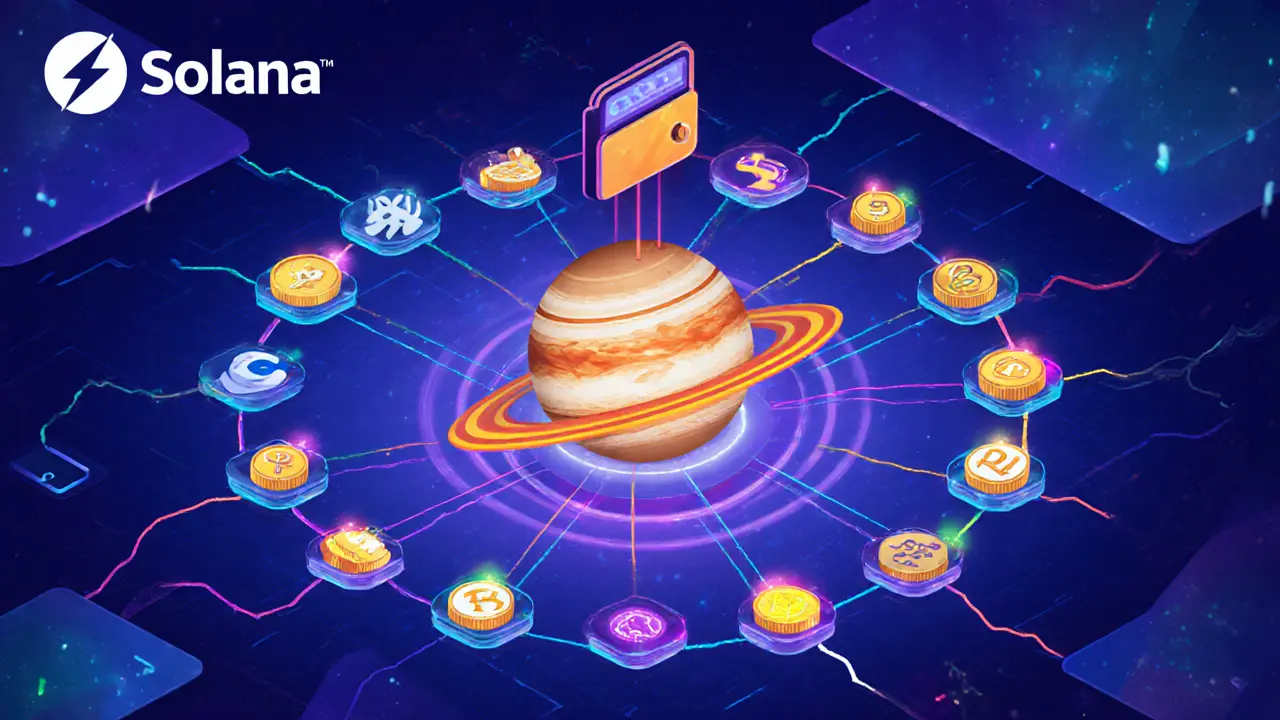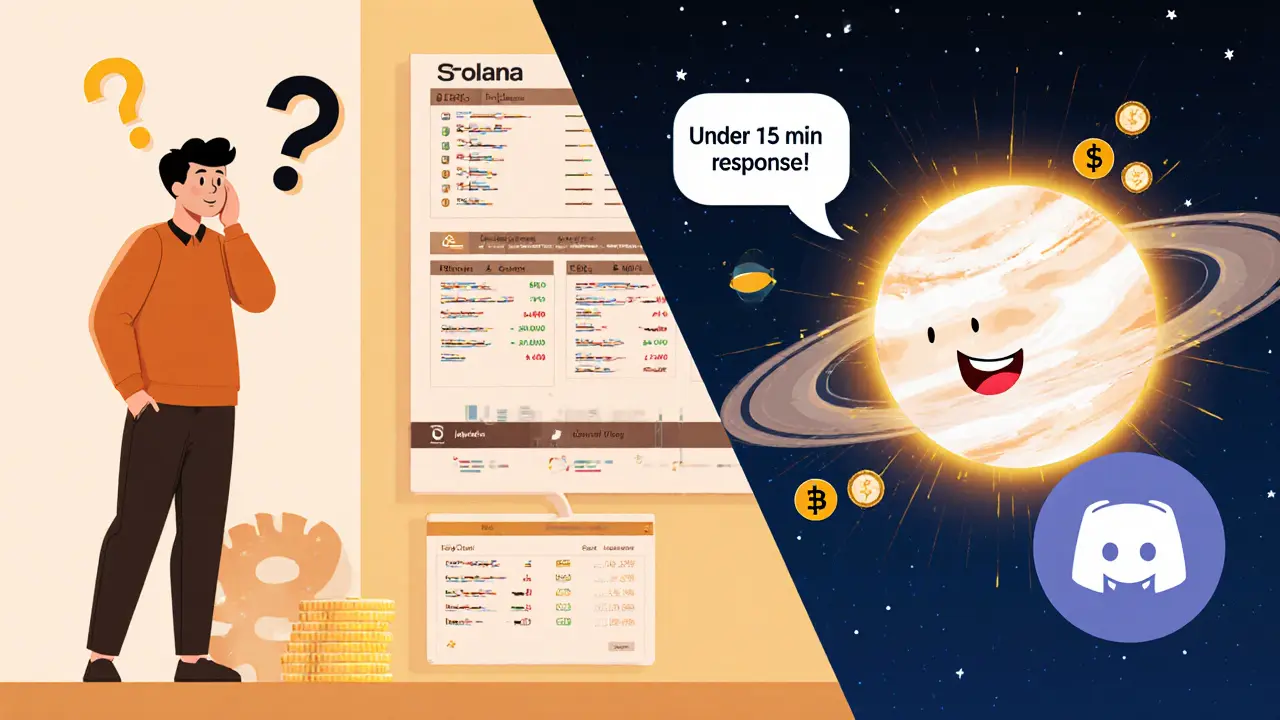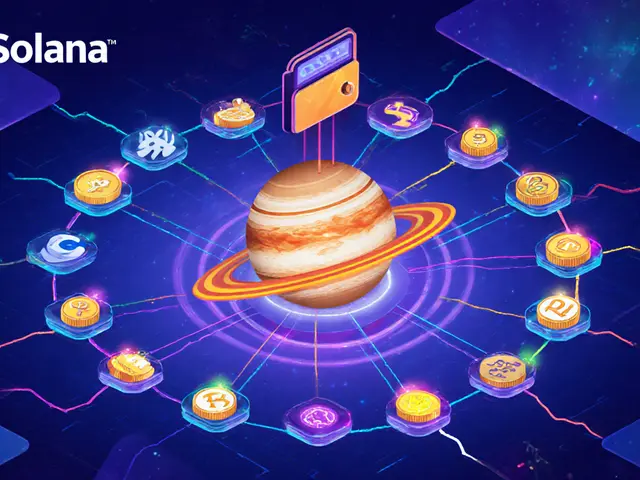What is Jupiter (JUP) Crypto Coin? The Solana DeFi Aggregator Explained

Jupiter Slippage Calculator
Swap Calculator
How It Works
Jupiter aggregates liquidity across 15+ DEXs on Solana to minimize slippage. Your trade is split across optimal liquidity pools for the best price.
This calculator estimates your trade impact based on current market conditions.
Trade Analysis
Estimated Slippage
Compared to single DEX: 75% less slippage
Your trade will be executed across 3-5 liquidity pools
Time to execute: 0.4-0.6s
Enter trade amount to see slippage analysis
Jupiter (JUP) isn't just another cryptocurrency. It's the backbone of decentralized trading on Solana. Think of it as the smartest price-finder for swapping tokens on one of the fastest blockchains in crypto. If you've ever tried to trade SOL for USDC and ended up paying too much in slippage or waiting minutes for a transaction, Jupiter was built to fix that. It doesn't hold your coins-it finds the best deal across 15+ exchanges and executes the swap in under a second. And since its launch in 2021, it’s grown into far more than just a swap tool. Today, Jupiter is a full DeFi superapp with futures trading, liquidity pools, and even a launchpad for new Solana projects-all governed by its native token, JUP.
How Jupiter Works: Aggregating Liquidity Like a Pro
Jupiter doesn’t operate its own order book. Instead, it scans every major decentralized exchange on Solana-like Raydium, Orca, and Serum-in real time. When you want to swap tokens, Jupiter’s algorithm splits your order across multiple pools to get you the best possible rate. This is called liquidity aggregation. For example, if you’re trading $5,000 worth of SOL for USDT, Jupiter might route half through Raydium and half through Orca to avoid dragging the price down. That’s called minimizing slippage. On Ethereum-based aggregators, this process can take 3-5 seconds. On Jupiter, it’s done in 400-600 milliseconds, thanks to Solana’s speed.
That speed matters. In September 2024, during a major Solana network spike, Jupiter still handled over $1 billion in daily trades. It’s now responsible for 35% of all DEX volume on Solana, according to Messari’s Q3 2024 report. That’s more than any other single DeFi app on the chain. It’s even surpassed Uniswap in daily volume on some days. The platform has collected $3.8 billion in total gas fees paid by users-five times more than its closest competitor on Solana. That’s not luck. It’s engineering.
The JUP Token: More Than Just Governance
When Jupiter launched, the JUP token was meant to be purely a governance token. Holders could vote on protocol upgrades, fee structures, and new features. But that changed in January 2025. A community-driven proposal, pushed by pseudonymous developer Weremeow, successfully reduced the total supply of JUP from 10 billion to 7 billion tokens. This wasn’t just a burn-it was a coordinated effort: 30% of team allocations were voluntarily reduced, 30% of future emissions were cut, and reserves were trimmed. The result? A deflationary pressure that analysts called “a rare example of community-aligned tokenomics.”
Today, JUP has real utility beyond voting. To access Jupiter’s LFG Launchpad-where new Solana projects get funded-you need to hold JUP. To earn rewards from the Jupiter Liquidity Provider (JLP) pool, you stake JUP alongside other tokens. And the yields? At its peak, the JLP pool paid over 138% APY. While that’s dropped since, it still offers competitive returns compared to most DeFi protocols. As of October 2025, JUP trades around $0.40, with a market cap of $1.35 billion and over 1.2 million unique wallets holding it.
What Else Can You Do With Jupiter?
Jupiter’s evolved into a one-stop DeFi hub. Beyond swaps, here’s what’s live:
- Jupiter Perps: A perpetual futures exchange offering up to 100x leverage on SOL, BTC, and ETH derivatives. It runs on Solana, so trades settle in under a second.
- JLP Pools: Stake your JUP and other tokens to earn a share of trading fees. Users have reported earning thousands in a month with $10k+ positions.
- LFG Launchpad: The first project ever launched here? JUP itself. Now, new Solana tokens are voted on by the community before listing.
- Upcoming: JUSD: A yield-bearing stablecoin planned for Q2 2025, designed to earn interest while holding value.
These aren’t side features. They’re core to Jupiter’s vision: becoming the default DeFi interface on Solana. And it’s working. Over 98,000 people hang out in its Discord server. The average response time to a support question? Under 15 minutes during business hours.

Who Is Jupiter For? And Who Should Avoid It?
Jupiter shines for active traders. If you’re swapping $10,000 or more, its routing engine saves you real money. For small trades under $100, it might be overkill. A direct swap on Raydium could cost less in gas. But for mid-to-large trades? Jupiter is the clear winner.
It’s also ideal for those already using Solana. If you’re on Phantom or Backpack wallets, integration is seamless. But if you’re on Ethereum or BSC, Jupiter won’t help you. It doesn’t connect to other chains. That’s its biggest weakness. Cross-chain aggregators like 1inch can route across multiple blockchains. Jupiter only works on Solana. That’s a trade-off: maximum performance on one chain, zero flexibility on others.
Beginners might find it overwhelming. The interface has dozens of options: perps, pools, launchpad, governance. Trustpilot reviews show 32% of negative feedback cites a “steep learning curve.” Most users report needing 2-3 hours to master basic swaps, and 1-2 weeks before trying advanced features. But the documentation is excellent-4.7/5 on GitHub-and the community is active and helpful.
Big Risks: Solana’s Stability and Regulatory Shadows
Jupiter’s power comes from Solana. But so does its biggest risk. In December 2024, Solana went down for 72 hours. Jupiter went dark with it. Swap failures hit 15-20% during peak congestion in September 2024. If Solana has another outage, Jupiter can’t function. That’s a single-point failure no other DeFi app on Ethereum has to worry about.
There’s also regulatory uncertainty. The SEC has started targeting governance tokens like JUP, calling them unregistered securities. While Jupiter’s decentralized structure offers some protection, future legal action could restrict access for U.S. users. That’s not a certainty-but it’s a risk that’s growing.

What’s Next for Jupiter?
The roadmap is ambitious. By Q1 2025, Jupiter plans to add cross-margin to its perps exchange, letting users use one position as collateral for another. In 2026, it plans to expand beyond Solana-finally becoming a multi-chain aggregator. That would be a game-changer. But for now, its strength is deep integration with Solana’s ecosystem. The JUSD stablecoin launch in Q2 2025 could also unlock new DeFi possibilities, like earning yield on stablecoin holdings without leaving the Jupiter app.
Analysts are split on price. FlitPay predicts JUP could hit $1.64 by end of 2025. CoinCodex is more cautious, targeting $0.85. But numbers aside, the real value of JUP isn’t in its price-it’s in its role as the engine of Solana’s DeFi economy. If Solana keeps growing, Jupiter will grow with it.
How to Get Started With Jupiter
Here’s how to start using Jupiter in 3 steps:
- Get a Solana wallet: Phantom, Backpack, or Solflare are the most popular. All integrate directly with Jupiter.
- Buy SOL: You’ll need it to pay for gas fees. Buy on an exchange like Kraken or Binance, then send it to your wallet.
- Go to jup.ag: Connect your wallet, pick your tokens, and hit swap. The platform will show you the best route automatically.
For JLP pools or perps, you’ll need to learn a bit more. Jupiter’s website has detailed guides. And don’t skip the Discord-ask questions. The community is one of the most active in crypto.
Is Jupiter (JUP) a good investment?
JUP isn’t a traditional investment like Bitcoin. It’s a utility token tied to the success of Solana’s DeFi ecosystem. If Solana keeps growing, Jupiter’s usage-and demand for JUP-will likely rise. The 2025 supply reduction gives it deflationary pressure. But it’s not a store of value. It’s a tool. Only invest what you’re comfortable losing, especially given Solana’s network risks.
Can I stake JUP to earn rewards?
You can’t stake JUP directly for yield. But you can add JUP to Jupiter’s JLP (Jupiter Liquidity Provider) pools alongside other tokens like SOL or USDC. These pools earn a share of trading fees from the platform. At peak times, APY hit 138%. Today, it’s lower but still competitive. Always check current yields before depositing.
Why is JUP’s price so volatile?
The January 2025 airdrop dumped $616 million worth of JUP onto the market in one day. That caused massive sell pressure. Since then, price swings have calmed but remain tied to Solana’s network health, DeFi trends, and overall crypto sentiment. It’s not a stable asset. Expect volatility.
Is Jupiter safer than centralized exchanges?
Yes, in terms of custody. You never give up control of your funds on Jupiter. It’s non-custodial-your wallet holds everything. But it’s not risk-free. Smart contract bugs, Solana outages, or a major hack could still cause losses. Always use trusted wallets, double-check addresses, and never share your seed phrase.
Can I use Jupiter on my phone?
Yes. The Jupiter interface works on mobile browsers. But for the best experience, use the Phantom or Backpack wallet apps-they have built-in access to Jupiter’s swap and perps features. There’s no official Jupiter app yet, but the web version is fully responsive.
How does Jupiter compare to Uniswap?
Uniswap is the largest DEX on Ethereum. Jupiter is the largest DEX aggregator on Solana. Uniswap handles more total volume globally, but Jupiter often beats Uniswap in daily volume on Solana-specific trades. Jupiter is faster and cheaper for Solana users. Uniswap works across chains. Jupiter only works on Solana. They’re not direct competitors-they serve different ecosystems.
Final Thoughts
Jupiter isn’t trying to be Bitcoin. It’s not aiming to replace banks. It’s solving a very specific problem: making token swaps on Solana fast, cheap, and smart. And it’s doing it better than anyone else. The JUP token is the fuel that powers this engine-not a speculative asset, but a key to participation. If you’re active on Solana, you’ll likely use Jupiter. If you’re not, it’s still worth watching. Because in crypto, infrastructure like this often becomes the most valuable part of the stack.


DeeDee Kallam
jupiter is fire but my wallet cried after that last swap 😭
alvin Bachtiar
Let’s be real - Jupiter isn’t just an aggregator, it’s a masterclass in systemic efficiency. The liquidity routing algorithm operates with surgical precision, slicing orders across Raydium, Orca, and Serum to minimize slippage while leveraging Solana’s sub-second finality. The $3.8B in cumulative gas fees? That’s not a vanity metric - it’s proof of network trust. And the JUP token supply reduction? One of the few instances where community governance didn’t just vote - it *executed*. This isn’t DeFi 2.0. This is DeFi 3.0, and the rest of the ecosystem is still using dial-up.
Helen Hardman
OMG I just started using Jupiter last week and I’m already obsessed!! 🤩 Like, I used to hate how slow swaps were on other chains but now I’m just like - boom, SOL to USDC in 0.4 seconds?? I feel like a crypto wizard!! And the JLP pool? I staked $5k and made more in a week than my side hustle 😭 I even told my mom about it and she asked if it’s safe (she’s so sweet) and I said YES as long as you don’t share your seed phrase!! 🙏✨
Masechaba Setona
You all sound like you got paid to promote this. Solana’s been down 3 times in 18 months. Jupiter’s entire value proposition collapses the moment the network fails. And now they’re pushing JUSD? A stablecoin on a chain that can’t stay online? This isn’t innovation - it’s a house of cards built on sand. And don’t even get me started on the SEC watching. JUP is a security. They’re just pretending it’s not.
Edgerton Trowbridge
The architectural design of Jupiter represents a significant advancement in decentralized exchange infrastructure. Its non-custodial model, combined with real-time liquidity aggregation across multiple protocols, eliminates the traditional friction points associated with fragmented order books. Furthermore, the tokenomics of JUP demonstrate a rare alignment between protocol incentives and community participation. The voluntary reduction in token supply, coupled with utility expansion through LFG and JLP, creates a self-reinforcing ecosystem. While Solana’s network stability remains a systemic risk, the composability of Jupiter’s features suggests a scalable foundation for future multi-chain expansion.
naveen kumar
JUP airdrop was a pump-and-dump disguised as community governance. 30% of team tokens ‘voluntarily’ reduced? Sure. Meanwhile, the early whales dumped 80% of their holdings within 48 hours. And now they’re pushing JUSD? A stablecoin on Solana? The same chain that went down for 72 hours? This isn’t DeFi - it’s a casino with better UI. The only thing ‘decentralized’ here is the blame when it all crashes.
Bruce Bynum
Jupiter’s the real deal if you’re on Solana. Fast, cheap, smart. No fluff.
Wesley Grimm
The 138% APY on JLP was a temporary distortion caused by excessive emission incentives. Now that it’s normalized to 12-18%, the narrative has shifted from ‘yield farm’ to ‘utility token.’ That’s not a feature - it’s a red flag. The entire value proposition hinges on speculative demand, not organic usage. And the fact that 35% of Solana DEX volume flows through one protocol? That’s centralization by another name.
mark Hayes
i tried jupiter last night after reading this and holy smokes it was smooth as butter 🤯 i was scared to swap 2k sol but it took 3 seconds and i saved like $40 in slippage. the interface is kinda busy but the guides helped. also the discord mod replied in 8 mins 😭 i love this community
Kymberley Sant
so jupiter is like the uber of crypto swaps? but like… why do i need to hold JUP to use it? if its just an aggregator why cant i just pay gas and go? feels like they’re forcing token hold to make it a ‘platform’… and now they want to launch JUSD? on solana? after the 72hr outage? someone please explain this logic to me
Derek Hardman
The integration of Jupiter into Phantom and Backpack wallets represents a significant step toward mainstream adoption of DeFi tools. The seamless user experience, coupled with transparent fee structures and real-time analytics, reduces the cognitive load typically associated with decentralized trading. Moreover, the community-driven governance model - particularly the successful token supply reduction - demonstrates a level of institutional maturity rarely seen in the crypto space. While Solana’s infrastructure remains a single point of failure, Jupiter’s architectural design mitigates risk through distributed liquidity routing. This is not merely a tool - it is an ecosystem.
Elizabeth Melendez
i just wanna say thank you to everyone who helped me on discord when i messed up my first jlp deposit 😭 i thought i lost everything but you guys walked me through it and i got my funds back!! and now i’m staking with my sis!! we’re both learning and it feels so good to be part of something that actually helps people!! jupiter isn’t just tech - it’s a family!! 🤗💖
Jeremy Jaramillo
I’ve been in crypto since 2017. I’ve seen dozens of ‘revolutionary’ tools come and go. Jupiter is different because it doesn’t just solve a problem - it redefines what’s possible within a single-chain ecosystem. The speed, the liquidity depth, the community engagement - it’s all intentional. And yes, Solana’s outages are a risk. But so is trusting centralized exchanges. This isn’t perfect, but it’s the most honest, transparent, and user-focused DeFi platform I’ve used. If you’re on Solana, you’re already using Jupiter. You just didn’t know it yet.
Matthew Affrunti
I used to think DeFi was too complicated. Then I tried Jupiter. Now I’m doing perps and JLP and I feel like I finally get it. No hype. Just clean code and real results. If you’re scared to start - just swap $10. See how fast it is. Then come back and thank me.
Sammy Krigs
did u guys know that jup token is actuallt owned by a single wallet that controls 12%? and the ‘community vote’ to reduce supply? that was pushed by a guy who owns 3.2% and got 400k votes from bots? i checked the txns. its all staged. this is a puppet show. and you’re all the puppets. 🤡
Bhavna Suri
This is too complicated. Why not just use Binance?